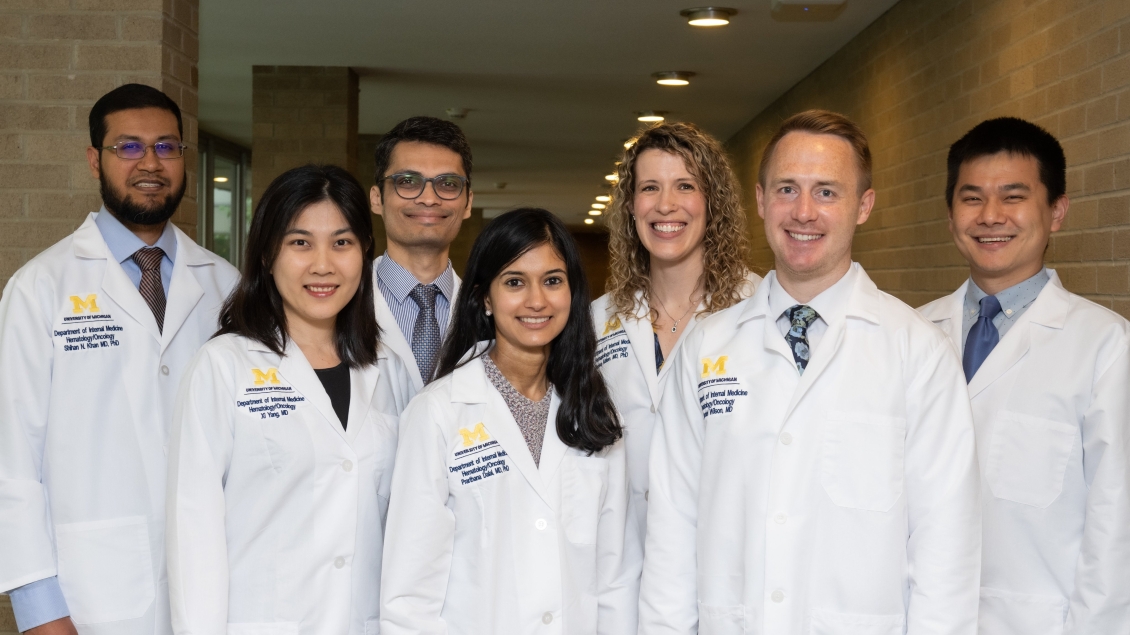
The Hematology/Oncology Fellowship Program at the U-M Medical School Department of Internal Medicine Division of
Hematology and Oncology is designed to train the next generation of leaders in academic and clinical hematology, and medical oncology. As a comprehensive program, we offer dual certification in both Hematology and Medical Oncology as defined by the American Board of Internal Medicine (ABIM), as well as the Accreditation Council for Graduate Medical Education (ACGME).
Our program is three years in length. The first year focuses on clinical training. In accordance with the Accreditation Council for Graduate Medical Education (ACGME) and American Board of Internal Medicine (ABIM) guidelines, fellows will complete 18 months of clinical experience in hematology and medical oncology. This incorporates both inpatient and outpatient experiences at the University Hospital as well as the Veterans Affairs Ann Arbor Healthcare System (VAAAHS). The majority of time in the second and third years are spent in independent research, under either the basic science research track or the clinical investigators track.
In addition, our fellows contribute to an active board review course and the maintenance of two University of Michigan-authored board review books. They also collaborate with our faculty to attain credit towards ABIM Maintenance of Certification (MOC) on an on-going basis through completion of self-assessment and quality improvement modules in a group setting.
C369 Med Inn Building, SPC 5848
Ann Arbor, MI 48109
The University of Michigan offers highly competitive salaries and generous benefits to our fellows and advanced trainees. Trainee salary will be commensurate with that of a House Officer at an equivalent level of training based on the HOA contract.
We are committed to equipping each fellow with the necessary tools they need to excel as experts and leaders, and empowering them to advance patient care, research, and education in hematology and oncology.
The first year of the program focuses on clinical training. Fellows will complete the remaining six months of clinical effort over the second and third years. Your clinical experience will also be guided by the University of Michigan Graduate Medical Education (GME) program, which oversees all house officers at the University of Michigan.
During the clinical portion of training, fellows divide their time between University Hospital, the Michigan Medicine Rogel Cancer Center, and the Veterans Affairs Ann Arbor Healthcare System (VAAAHS). The combined institutions have more than 1,200 beds. The UMCCC sees more than 55,000 clinical visits each year.
Fellows will work on both inpatient and outpatient services, providing care and consultative services in hematology and medical oncology to a varied population of patients.
During the clinical time, fellows will also choose and participate in a series of 6-month continuity clinics under the supervision of a faculty member.
Trainees attend a wide variety of teaching conferences, including an orientation ‘boot-camp’ lecture series operated by the senior fellows, weekly hematology/medical oncology Cancer Center Grand Rounds, a weekly fellow-run divisional clinical case conference, as well as weekly disease-oriented teaching sessions. Fellows also have the opportunity to participate in more than a dozen different multidisciplinary tumor boards.
Fellows will only take call during their first twelve months of training, much of which is accomplished from home during the week. Weekend call is shared equally among the first-year fellows, equating to weekend coverage occurring approximately one in seven weekends.
After the first year of intensive clinical training, the second and third years offer 75% protected research time. During the second and third years, fellows will also complete the remaining six months of their clinical training requirement. All on-call time will be completed during the first year, leaving ample protected time for the fellow’s research efforts. Our fellowship training program offers two possible research tracks: a clinical investigator track and a basic science research track.
Research opportunities in hematology and medical oncology at Michigan span the full spectrum, including basic science, translational studies, and clinical investigation.
Fellows are supported via a NIH training grant, in its 35th year of continuous funding. Fellows are encouraged to submit a K30, K08, ASCO YIA, or other similar grant proposals during their second and third years to gain experience in extramural grant applications. Applicants must be US citizens or permanent residents to be appointed to the training grant.
Individuals accepted to the U-M Medical School Physician Scientist Training Program (PSTP) will complete two years of Internal Medicine residency, followed by four years of fellowship training. Those PSTP residents who choose hematology and medical oncology for their fellowship will be assigned to the basic science research track.
The clinical investigator track is a program geared for applicants who wish to become skilled clinical hematologists and/or medical oncologists with the intention of developing the skill set necessary to develop and manage the operation of clinical trials. The program will allow fellows to personally observe the regulatory operations of clinical trials, with the expectation of the development of a project under the supervision of a faculty mentor. The research program will be overseen by a research committee developed by the fellow with their mentor. The committee will meet at a minimum of two times each year to review and provide feedback for the fellow’s research project(s).
The basic science research track is a program geared for applicants who wish to become skilled clinical hematologists and/or medical oncologists with the intention of developing the skill set necessary to develop and to manage the operation of independent research laboratories. The program will allow fellows to function in cutting edge laboratory research, under the supervision of a faculty mentor, ranging from cancer genetics, drug discovery, pharmacogenomics, and health policy, just to name a few. The research program will be overseen by a research committee developed by the fellow with their mentor. The committee will meet at a minimum of two times each year to review and provide feedback for the fellow’s research project(s).
The Hematology/Oncology Fellowship Training Program at the U-M Medical School prides itself on having an interactive, responsive program that incorporates fellow’s comments and concerns into the training program. We also include trainees in the decision-making processes that govern the operations of our training program.
Below is a list of recent programs that have had direct trainee involvement.
Our fellows work on an annual quality improvement project as part of a guided curriculum with a faculty member. Prior projects have included:
- Improving the referral process for patients with Cancer of Unknown Primary
- Improving the transition from inpatient to outpatient care for hospitalized patients who are diagnosed with malignancy
- Streamlining hematology referrals at the VA
- Working to standardize oral chemotherapy administration for hospitalized patients
The focus of the journal club is to review the medical literature with a specific didactic emphasis on trial design, biostatistics, screening studies, and biomarkers in oncology. We encourage the utilization of the McMaster criteria to critically assess the literature together with the assistance of biostatisticians that attend this conference. Fellows and faculty alike find these sessions interactive and helpful for developing the skills needed to critically review medical literature.
To date, we have published two board review books as a fellowship program.
Together with our clinical pharmacists, we have developed a comprehensive review course of the current drugs and agents used to treat hematologic and oncologic disorders. This course is presented annually by our pharmacists. We are in the process of writing a Comprehensive Pharmacology Manual that will cover all agents discussed.
We pride ourselves in training highly accomplished physicians who are able to competitively seek employment in academic, government, and private practice settings. This is reflected in the placement of our recent graduates the first year after fellowship.
- Marcus Geer, MD - Michigan Medicine, Ann Arbor, MI
- Lauren Shevell, MD - Michigan Medicine, Ann Arbor, MI
- Radhika Takiar, MD - Trinity Health, Ann Arbor, MI
- Irene Tsung, MD - Michigan Medicine, Ann Arbor, MI
- Thomas Westbrook, MD - Rush University, Chicago, IL
- James Yoon, MD - Beth Israel Deaconess Medical Center, Boston, MA
- Lisa Chu, MD - University of Colorado, Aurora, CO
- Nicole Fleege, MD - University of Iowa, Iowa City, IA
- Stephanie Hoffman, MD - Trinity Health IHA, Ypsilanti, MI
- Arathi Mohan, MD - Michigan Medicine, Ann Arbor, MI
- Kamya Sankar, MD - Cedars-Sinai, Los Angeles, CA
- Eric Schwartz, MD - Kaiser Permanente, Lafayette, CO
- Christopher Su, MD - University of Washington, Seattle, WA
- Jason Brown, MD, PhD - Seidman Cancer Center, University Hospitals, Cleveland, OH
- Amy Chang, MD - Loxo Oncology
- Jason Chen, MD - Michigan Medicine/VA AA, Ann Arbor, MI
- Charles Foucar, MD - Michigan Medicine, Ann Arbor, MI
- Jennifer Girard, MD - Michigan Medicine, Ann Arbor, MI
- Vincent Ma, MD - University of Wisconsin, Madison, WI
- Phoebe Tsao, MD - Michigan Medicine, Ann Arbor, MI
The Department of Internal Medicine (DOIM) Division of Hematology and Oncology is committed to creating and cultivating a diverse and inclusive community that provides our faculty, learners, and staff with the opportunities and support they need to thrive. Visit the DOIM Office of Diversity, Equity, Inclusion, and Well-Being to learn more.
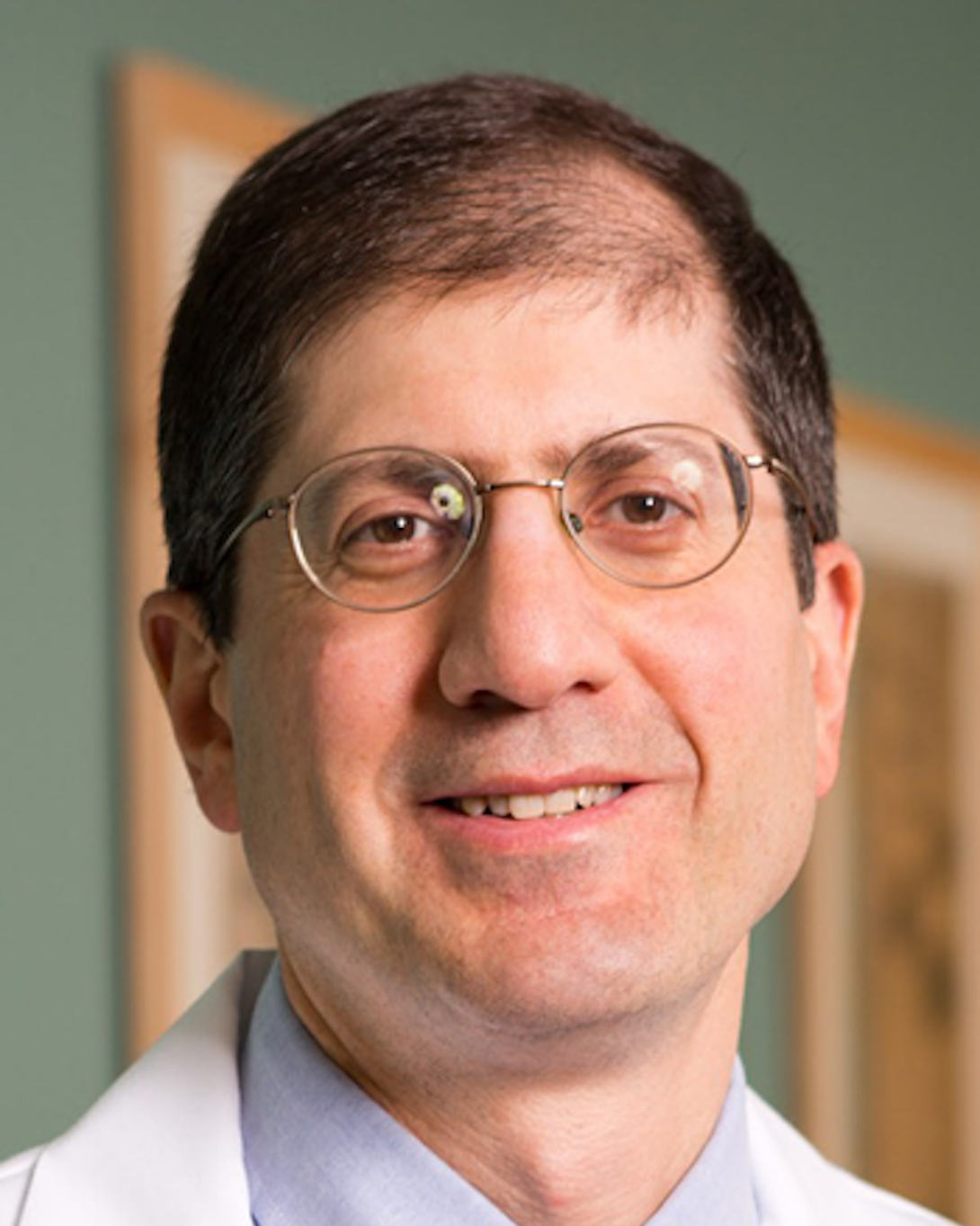
Associate Division Chief for Faculty Development & Education
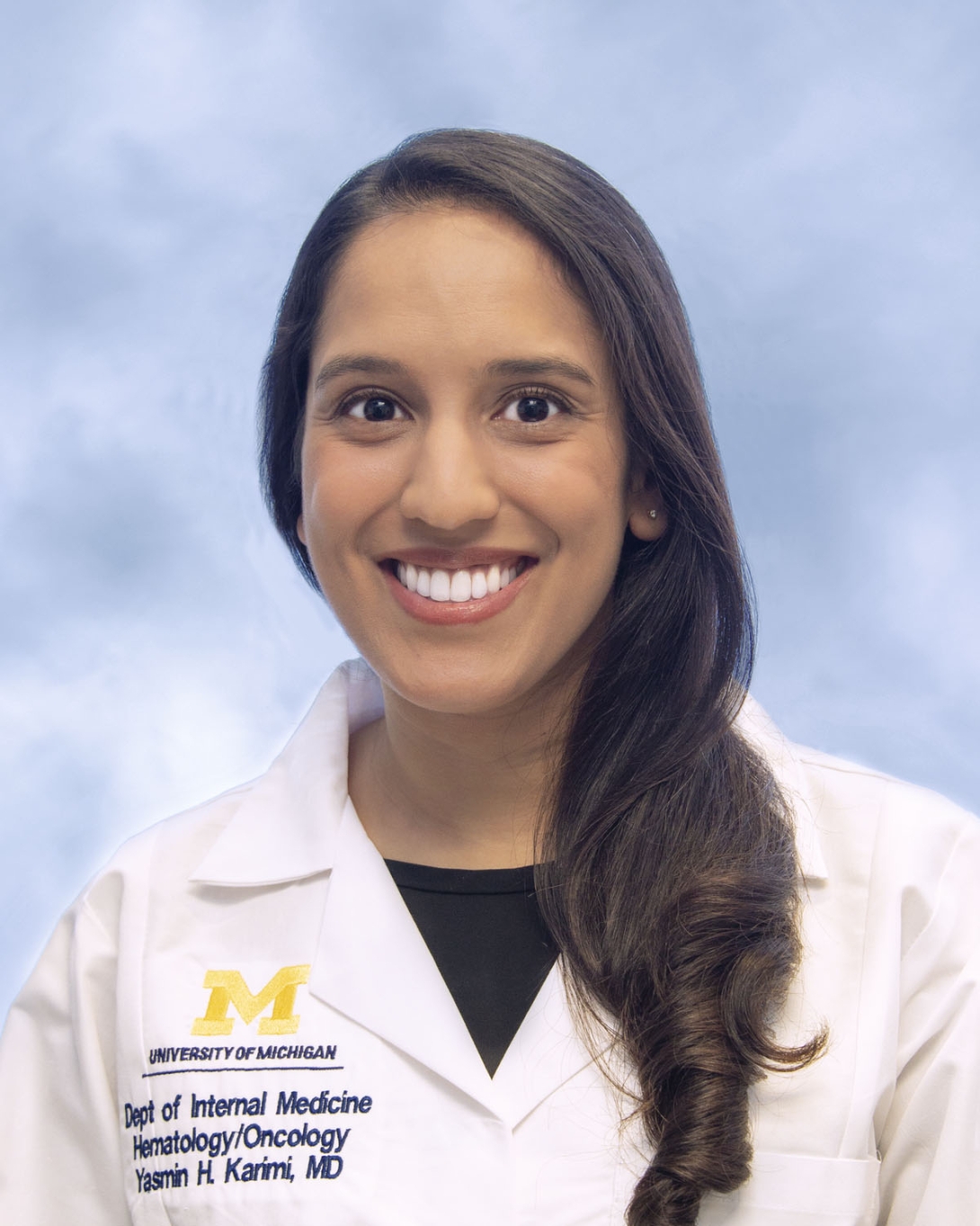
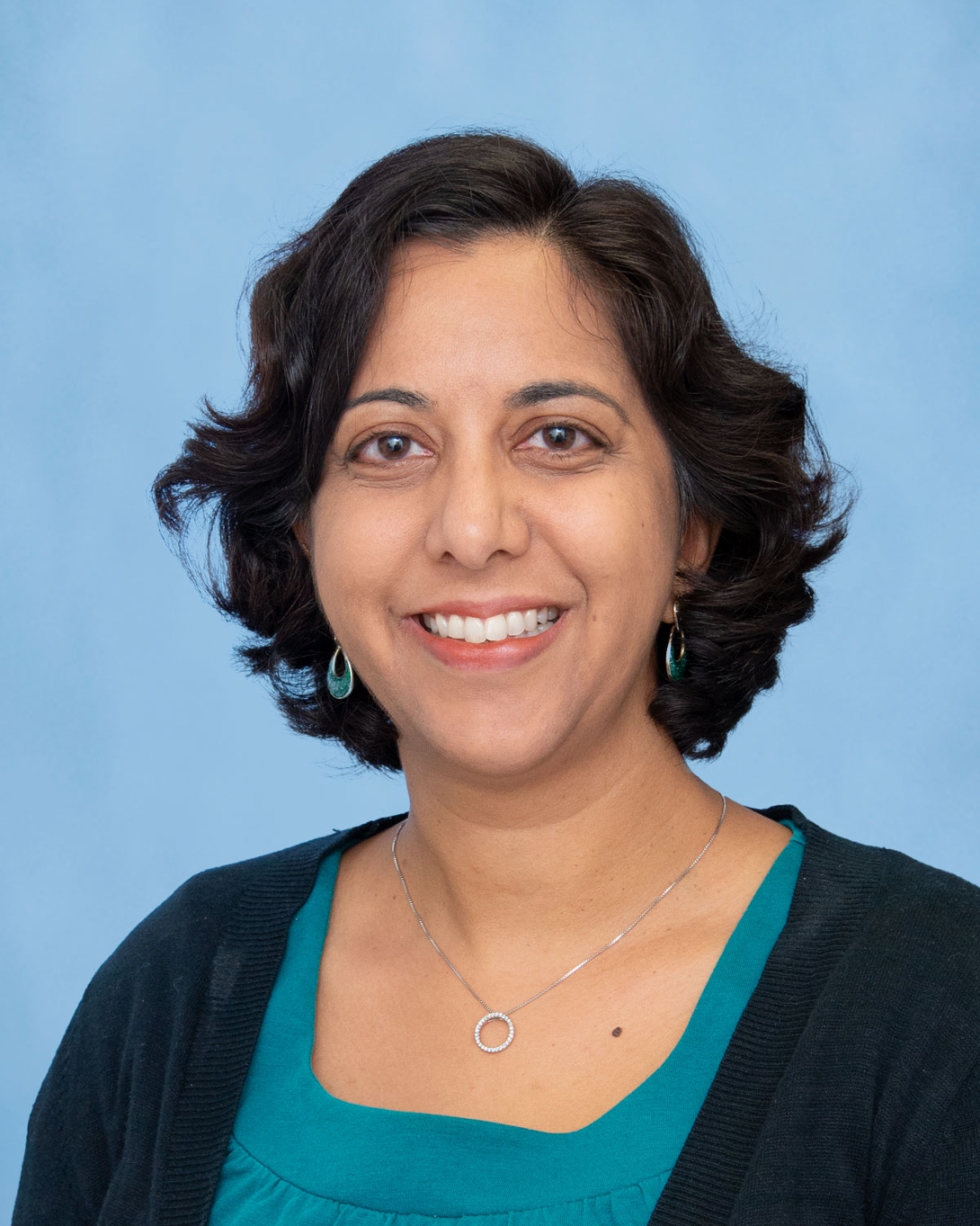
Associate Professor of Surgery and Associate Fellowship Director
Hematology/Oncology
Internal Medicine
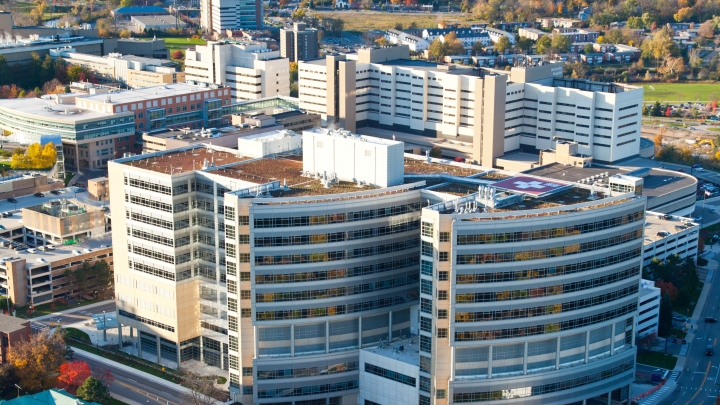
Expand your career trajectory in a high-volume academic medical center that also supports and excels in a wide range of basic science, translational and clinical research programs.

We find a new reason to love Ann Arbor nearly every day — year-round outdoor activities, cultural experiences, a growing food scene, and a welcoming, family-friendly atmosphere are just a few that come to mind. Explore all that Ann Arbor and our surrounding communities have to offer.